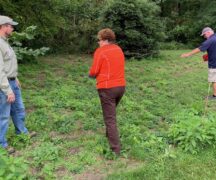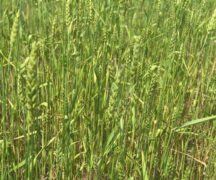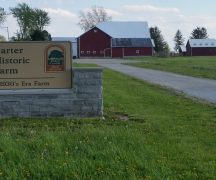By JAN LARSON McLAUGHLIN
BG Independent News
In her burgundy bib overalls and farm boots, Corinne Gordon spends her days baking recipes from the 1930s, tapping maple trees, collecting eggs, tending to the garden, and giving tours of a one-room school.
As the historic farm specialist at Wood County Park District’s Historic Carter Farm, north of Bowling Green, many of Gordon’s “chores” reflect life on the farm nearly a century ago. She does, however, have the luxury of using indoor plumbing over the outhouse still standing behind the farmhouse.
The farm is a perfect fit for Gordon, from New Hampshire, whose previous jobs were at museums and historic sites.
“There aren’t a ton of living history farms,” she said, sitting in her office in the old farmhouse. Next to her are three pair of boots – for different jobs depending on the messiness. “I’m very happy with where I wound up.”
Gordon takes care of the farm’s animals, which currently include four sheep, two goats, about 25 chickens, and four cats. “The friendliest barn cats I’ve ever seen,” she said. The park district is hoping to soon add cows, horses and pigs.
And she tends to all the out buildings – like the chicken coop, grain barn, corn barn, outhouse, farrowing house for pigs, main barn and the one-room Zimmerman School, which is located a short walk past a field behind the barns.
Then there’s the garden, planted each summer with cucumbers, tomatoes, zucchini, beets, carrots, sweet corn, pumpkins, squash and ground cherries, which “made a nice pie,” she said.
Many of the vegetables and fruits are canned and pickled. And many are put straight into old-time recipes such as maple onion conserve (jam). “We used maple syrup we made here last year,” she said.
Gordon uses a 1930s cookbook to whip up butterscotch cookies, cinnamon apple jelly, and fried cucumbers with a tartar sauce using pickled watermelon rind.
“It’s important to know where we’ve come from – how we got to the nice lives we have,” she said. “It’s good to know how nice you have it. It makes you appreciate it more.”
Chores were time-consuming, but necessary for survival in the 1930s, she explains to children and adults who tour the farm.
“There’s plenty about the ‘30s I’m not jealous of, but the ways they had to live, repairing or reusing clothes and household objects, eating and preserving produce when it was at its peak, building things to really last, are good for the environment, the budget, and sometimes the waistline,” Gordon said.
“They take more time, certainly, than chucking a shirt at the first sign of a hole or tossing a TV dinner in the microwave, but it gives you something custom to how you want it.”
The historic farm programs teach useful skills, like cooking, gardening, knitting, crocheting, mending, spinning and spatter painting.
“The point of most of our programs – mending, maple sugaring, crocheting, canning, etc. – isn’t just to come for a few hours, have a snack, and never do the thing ever again after. It’s to actually learn skills that people are slowly regaining interest in,” Gordon said.
Oddly, children who resist chores at home are eager to help with chores at the farm – like feeding the animals, using the corn sheller, and even washing clothes.
“They tend to love doing the laundry with the agitator and the wringer,” Gordon said.
Gordon said she grew up with parents who were always making things – woven glass bead necklaces, stained glass lampshades, glittery calligraphy, and little electronic gizmos.
“It can be relaxing, or fun, or a bonding experience to work on a craft, and you wind up with something uniquely yours at the end. These are all very different than the crafts I grew up doing,” she said. “I guess I wound up seeing the value of having, or gifting, things you made yourself.”
The Historic Carter Farm partners with other groups – like the Black Swamp Spinners Guild, which will soon start meeting at the farm and whose members will help card the sheep wool.
The park district plans to work with a farmer to plant buckwheat and other grains to be milled at the Ludwig Mill in Grand Rapids.
“We’re excited about that partnership,” Gordon said.
And the farm is looking for a 4-H or FFA member who lives close enough and wants to raise calves in the barn this spring.
More information on the historic farm can be found at: https://www.wcparks.org/parks/carter-historic-farm-zimmerman-schoolhouse/





